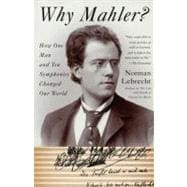
Note: Supplemental materials are not guaranteed with Rental or Used book purchases.
Purchase Benefits
What is included with this book?
Norman Lebrecht has written several best-selling works of nonfiction, including The Maestro Myth and Who Killed Classical Music? He is also the award-winning author of the novels The Song of Names and The Game of Opposites. He writes regularly for Bloomberg.com and The Wall Street Journal, and he presents The Lebrecht Interview series on BBC Radio 3 and The Record Doctor on WNYC. He lives in London.
| Preface: After Mahler, Another Deluge? | p. vii |
| Introduction: Desperately Seeking Mahler | p. xi |
| Why Mahler? | |
| Some Frequently Asked Questions | p. 3 |
| Who is Mahler?: The Life and Times | |
| Living in a Nowhere Land (1860-1875) | p. 21 |
| City of Dreams (1875-1887) | p. 34 |
| A Symphony Like the World (1887-1891) | p. 46 |
| Rise Again (1891-1894) | p. 58 |
| What Love Tells Me (1895-1897) | p. 72 |
| A Taste of Power (1897-1900) | p. 86 |
| The Most Beautiful Girl in Vienna (1901) | p. 103 |
| Small Interludes of Happiness (1902-1906) | p. 121 |
| Three Hammerblows (1907) | p. 140 |
| Discovering America (1907-1910) | p. 152 |
| "To Live for You, To Die for You" (1910-1911) | p. 177 |
| After Mahler (1911-2010) | p. 198 |
| Whose Mahler? | |
| A Question of Interpretation | p. 211 |
| How to Mahler | |
| Finding the Key to a Private Space | p. 261 |
| Acknowledgments | p. 264 |
| Notes | p. 267 |
| Bibliography | p. 290 |
| Index | p. 301 |
| Table of Contents provided by Ingram. All Rights Reserved. |
The New copy of this book will include any supplemental materials advertised. Please check the title of the book to determine if it should include any access cards, study guides, lab manuals, CDs, etc.
The Used, Rental and eBook copies of this book are not guaranteed to include any supplemental materials. Typically, only the book itself is included. This is true even if the title states it includes any access cards, study guides, lab manuals, CDs, etc.
The Vienna of Freud, Mahler, Mach, Wittgenstein, Schnitzler, Herzl, Trotsky, and the young Hitler forged the world we know today. It was a meeting point of individualism and collectivism, egotism and idealism, the erotic and the ascetic, the elevated and the debased. At its center whirled Gustav Mahler . . . The man and his music are central to our understanding of the course of civilization and the nature of human relationships.
Art that is both high and low, original and derived, breathtaking and banal, Mahler’s music resists textbook analysis. It is an open-ended mind game of intellectual and ironic discourse, a voyage of discovery that combines self-revelation, consolation, and renewal . . . Each symphony is a search engine for inner truths. To know Mahler is ultimately to know ourselves.